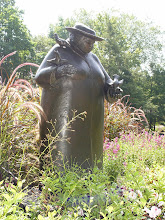- One of the first things animal-loving gringos notice is the ubiquity of street dogs (and cats, but the dogs are somehow more shocking). They are everywhere. Spay/neuter programs have not kept up with the need (if people even know they exist), and scrawny dogs with full breasts are a distressingly common sight. I have seen few puppies and do not want to think about their fate. Most families seem to have adopted a dog or two, at least to the point of naming and feeding them, but I have not seen an overweight dog or cat since arriving here. Another problem that I hate to mention but which is real: most street dogs are harmless, but dogs in groups can be aggressive, and at least one eightyish woman I know carries a large walking stick on her perambulations (and I must confess to keeping an eye out for available small stones just in case).
This little guy, encountered with some regularity on the beach near our house, is one of the lucky ones. His name is Yoyo, and he has been adopted by the caretaker of one of the beach houses.
- Trash. It is not unusual to see impromptu dumps under the "No tire basura" (basically "No littering") signs, and I woke one night, fearing an electrical fire because of the acrid smell seeping through the closed windows. It turns out that workers on one of the numerous construction sites (and this area is undergoing a lot of construction) were burning waste, which evidently included rubber or wiring of some kind. Trash-burning is still common here--most of it paper and palm fronds, fortunately. But the plastic inundating the Gulf and its beaches can have tragic results: a few days into my stay, a dead loggerhead sea turtle washed up a few blocks from here. An autopsy revealed that it had died from ingesting plastic waste.
- Poverty and inequality. There is great wealth in this part of the world, and has been for some time. The restored colonials, the 19th-century hennequin baron homes along the Paseo, and even the beach houses that stretch for miles are evidence of prosperity. But the homes in the colonias, the neighborhoods where most people actually live, are generally tiny, and often not in good repair. In 2005, a retired nurse who winters here opened the Chicxulub Food Bank to address the problem of malnutrition in the area. Its programs have grown and now provide vitamins to all village children under the age of ten, monthly food dispensas, English lessons, and nursing home programs. In the city, elderly beggars are common. The monthly social security payments are often not enough to meet living expenses, and people with no families to provide a safety net often sit outdoors in busy areas, holding a Styrofoam cup into which those so inclined can drop their spare change. It quickly struck me that, if I had lived in Mexico rather than the US and had not had the benefit of a decent public education system, I, as a childless female from a working-class background, could have been one of the old women begging outside the downtown churches. Something to think about .
This is a beautiful place, but like many places, it can break your heart.


1 comment:
You bringing back a friend?
Post a Comment